14 start with L start with L
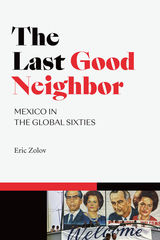
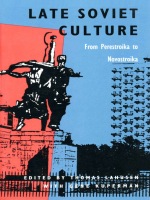
Leading scholars from the former Soviet Union and the West gather here to consider the fate of the people and institutions that constituted Soviet culture. Whether the speculative glance goes back (to czarist Russia or Soviet Freudianism, to the history of aesthetics or the sociology of cinema in the 1930s) or forward (to the "market Stalinism" one writer predicts or the "open text of history" another advocates), a sense of immediacy, or history-in-the-making animates this volume. Will social and cultural institutions now develop organically, the authors ask, or is the society faced with the prospect of even more radical reforms? Does the present rupture mark the real moment of Russia's encounter with modernity? The options explored by literary historians, film scholars, novelists, and political scientists make this book a heady tour of cultural possibilities. An expanded version of a special issue of South Atlantic Quarterly (Spring 1991), with seven new essays, Late Soviet Culture will stimulate scholar and general reader alike.
Contributors. Katerina Clark, Paul Debreczeny, Evgeny Dobrenko, Mikhail Epstein, Renata Galtseva, Helena Goscilo, Michael Holquist, Boris Kagarlitsky, Mikhail Kuraev, Thomas Lahusen, Valery Leibin, Sidney Monas, Valery Podoroga, Donald Raleigh, Irina Rodnyanskaya, Maya Turovskaya

Lenin’s politics continue to reverberate around the world even after the end of the USSR. His name elicits revulsion and reverence, yet Lenin the man remains largely a mystery. This biography shows us Lenin as we have never seen him, in his full complexity as revolutionary, political leader, thinker, and private person.
Born Vladimir Ilyich Ulyanov in 1870, the son of a schools inspector and a doctor’s daughter, Lenin was to become the greatest single force in the Soviet revolution—and perhaps the most influential politician of the twentieth century. Drawing on sources only recently discovered, Robert Service explores the social, cultural, and political catalysts for Lenin’s explosion into global prominence. His book gives us the vast panorama of Russia in that awesome vortex of change from tsarism’s collapse to the establishment of the communist one-party state. Through the prism of Lenin’s career, Service focuses on dictatorship, the Marxist revolutionary dream, civil war, and interwar European politics. And we are shown how Lenin, despite the hardships he inflicted, was widely mourned upon his death in 1924.
Service’s Lenin is a political colossus but also a believable human being. This biography stresses the importance of his supportive family and of its ethnic and cultural background. The author examines his education, upbringing, and the troubles of his early life to explain the emergence of a rebel whose devotion to destruction proved greater than his love for the “proletariat” he supposedly served. We see how his intellectual preoccupations and inner rage underwent volatile interaction and propelled his career from young Marxist activist to founder of the communist party and the Soviet state—and how he bequeathed to Russia a legacy of political oppression and social intimidation that has yet to be expunged.


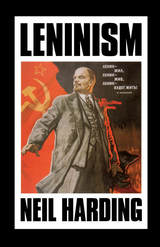
Rather than tracing the roots of Leninism to the details of Lenin’s biography, Harding shows how it emerged as a revolutionary Marxist response to the First World War and to the perceived treachery—the support of that war—by social democratic leaders. The economics, politics, and philosophy of Leninism, he argues, were rapidly theorized between 1914 and 1918 and deeply imprinted with the peculiarities of the wartime experience. Its complementary metaphysics of history and science was as intrinsic to its confidence and sureness of purpose as it was to its contempt for democratic practice and tolerance. But, as Harding also shows, although Leninism articulated a complex and coherent critique of capitalist civilization and held a powerful appeal to a variety of constituencies, it was itself caught in a timewarp that fatally limited its capacity to adapt. This book will engage not only Russian and Soviet specialists, but also readers concerned with the varieties of twentieth-century socialism.
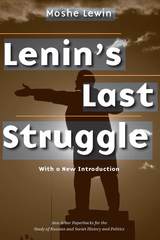
One of the great political strategists of his era, V. I. Lenin continues to attract historical interest, yet his complex personality eludes full understanding. This new edition of Moshe Lewin's classic political biography, including an afterword by the author, suggests new approaches for studying the Marxist visionary and founder of the Soviet state. Lenin's Last Struggle offers invaluable insights into the rise of the Bolshevik party and the Soviet Union, a saga complicated by complex strategic battles among the leaders of Lenin's generation: leaders whose names are universally known, but whose personalities and motivations are even now not sufficiently understood.
Moshe Lewin was a collective farm worker in the USSR and a soldier in the Soviet army. He later became director of studies at the Ecole Pratique des Hautes Etudes in Paris, a fellow of the Kennan Institute, a senior fellow of Columbia University's Russian Institute, and is now emeritus professor of history at The University of Pennsylvania.

Leon Trotsky was a key political figure of the twentieth century – a leader of the Russian Revolution, founder of the Red Army, author of books on literature, history, morality and politics.
Leon Trotsky: Writings in Exile contains some of his most insightful and penetrating works. Exiled and isolated by Stalin, Trotsky used the only weapon he had left – words. In these writings he defends the 1917 revolution, warns prophetically of fascism and analyses anti-colonial movements in the global south.
This collection gives a sense of the real Trotsky – passionate, humanist, Marxist. It will introduce the writings of one of history's great revolutionaries to a new generation.
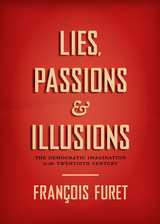
This conversation would be, sadly, Furet’s last—he died while Ricoeur was completing his edits. Ricoeur did not want to publish his half without Furet’s approval, so what remains is Furet’s alone, an astonishingly cohesive meditation on the political passions of the twentieth century. With strokes at once broad and incisive, he examines the many different trajectories that nations of the West have followed over the past hundred years. It is a dialogue with history as it happened but also as a form of thought. It is a dialogue with his critics, with himself, and with those major thinkers—from Tocqueville to Hannah Arendt—whose ideas have shaped our understanding of the tragic dramas and upheavals of the modern era. It is a testament to the crucial role of the historian, a reflection on how history is made and lived, and how the imagination is a catalyst for political change. Whether new to Furet or deeply familiar with his work, readers will find thought-provoking assessments on every page, a deeply moving look back at one of the most tumultuous periods of history and how we might learn and look forward from it.


Jurij Striedter provides a dynamic introduction to and critique of Russian Formalism and Czech Structuralism. He makes clear the pathbreaking contribution of these European schools to modern literary theory and criticism, placing them in their contemporary contexts and at the same time relating them to ongoing debates in America.
Striedter gives an authoritative account of the development of Russian Formalism from its birth around 1915 through its forced end in the late 1920s, focusing on the contributions of Roman Jakobson, Mikhail Bakhtin, and others to the theory and analysis of literary history, literary genres and narrative prose. He compares the concepts of the literary work, literature as system, and literary evolution in both Russian Formalism and Czech Structuralism to show how these early formalistic approaches led to an elaborated structuralist and semiotic concept of literature as a historically changing system correlated to society and cultural change. He sets forth the work of Jan Mukarovsky and Felix Vodicka, whose Czech Structuralist theory of literary evolution and literary reception (or reader response) anticipated much recent theorizing.
Finally, Striedter brings these ideas into play by showing how they can contribute to the debate of the last few years in North America and Europe about the key issue of literary evaluation. This book and the theories it discusses challenge our contemporary understanding of literature, its history, and its functions in society and human life.
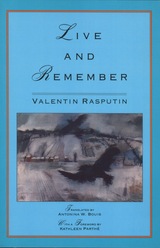
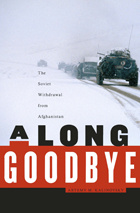
The conflict in Afghanistan looms large in the collective consciousness of Americans. What has the United States achieved, and how will it withdraw without sacrificing those gains? The Soviet Union confronted these same questions in the 1980s, and Artemy Kalinovsky’s history of the USSR’s nine-year struggle to extricate itself from Afghanistan and bring its troops home provides a sobering perspective on exit options in the region.
What makes Kalinovsky’s intense account both timely and important is its focus not on motives for initiating the conflict but on the factors that prevented the Soviet leadership from ending a demoralizing war. Why did the USSR linger for so long, given that key elites recognized the blunder of the mission shortly after the initial deployment?
Newly available archival material, supplemented by interviews with major actors, allows Kalinovsky to reconstruct the fierce debates among Soviet diplomats, KGB officials, the Red Army, and top Politburo figures. The fear that withdrawal would diminish the USSR’s status as leader of the Third World is palpable in these disagreements, as are the competing interests of Afghan factions and the Soviet Union’s superpower rival in the West. This book challenges many widely held views about the actual costs of the conflict to the Soviet leadership, and its findings illuminate the Cold War context of a military engagement that went very wrong, for much too long.
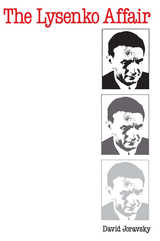
"A standard source both for Soviet specialists and for sociologists of science."—American Journal of Sociology
"Joravsky has produced . . . the most detailed and authoritative treatment of Lysenko and his view on genetics."—New York Times Book Review
READERS
Browse our collection.
PUBLISHERS
See BiblioVault's publisher services.
STUDENT SERVICES
Files for college accessibility offices.
UChicago Accessibility Resources
home | accessibility | search | about | contact us
BiblioVault ® 2001 - 2024
The University of Chicago Press









